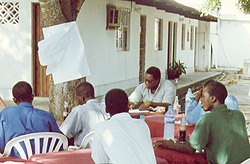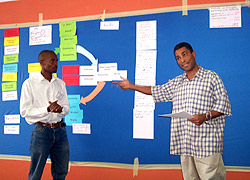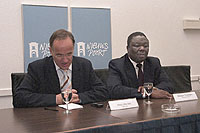|
|
 |
Strategy NiZA, according to its Mission Statement, aims at finding structural solutions in the fight against poverty, injustice and inequality. Structural solutions are those solutions that are based on sustainable changes on a political level.
In its three programmes NiZA focuses on three issues:
Within each of these areas NiZA supports both small-scale grassroots organisations and network organisations focusing on lobbying. Many grassroots organisations have been set up by communities that felt a need to tackle abuses, poverty and inequality themselves; examples include local radio stations and legal assistance groups. NiZA-supported network organisations, on behalf of their smaller and larger member organisations, engage e.g. in the fight for media freedom and for the respect of human rights, or against corruption.
Collaborating with local organisations
Sustainable political changes can only be attained by strong local organisations not linked to a government or state. Competent organisations which are firmly rooted in society are able to call attention to abuses, advocate changes, monitor governments and support and defend vulnerable groups.
 | | Mozambican journalist Salom„o Moyana training young journalists |
NiZA's activities are therefore largely aimed at strengthening the capacities of its partner organisations. NiZA offers its partners opportunities to carry out projects that will increase their capacity to perform core objectives in the fields of public information, lobby or expert knowlegde related to media, human rights or the economy. Additionally, attention is being paid to the managerial, financial and strategic planning capacities of organisations.
On the issue of capacity enforcement, the NiZA programmes work with PSO-financed 'Sector Plans'. The aim of a Sector Plan is to strengthen the entire sector rather than just one organisation; e.g. Namibian journalists may benefit from a training course for South African journalists if that course is executed under a Sector Plan.
 | | Workshop about teaching illiterate adults, Lilongwe, Malawi |
Besides focusing on capacity enforcement, NiZA, together with and on behalf of its partner organisations, engages in lobby and advocacy both in southern Africa and the Netherlands and the European Union. NiZA thus works towards strengthening the voice of organisations from the South.
Finally, NiZA works towards keeping the commitment of the Dutch people and the interest they take in southern Africa alive.
Exchange
However important it may be to dispatch experts, promoting mutual exchanges - both in Africa itself and between Africa and the Netherlands - and setting up networks is at least as important. NiZA, for example, offers African journalists a chance to work as trainees, follow courses and learn from each other.
Political lobby
 | | NiZA-director Peter Hermes and Zimbabwean opposition leader Morgan Tsvangirai (MDC) in The Hague |
Elsewhere, through political lobby, NiZA continues to advocate the interests of southern Africa. In its home country as well as in Europe the organisation calls attention to economic developments, the freedom of expression and the human rights situation.
Thus NiZA calls for genuine conflict prevention - that is, the prevention of war - rather than just running around putting out fires. NiZA also seeks to rally political support for the reconstruction of Angola and to suggest improvements in worldwide agreements on the conflict-related trade in raw materials such as diamonds and coltan.
NiZA also facilitates contacts between advocacy officers from southern Africa and leading figures and politicians from Europe.
| |
|
|

|
 |  |  |  |
|

